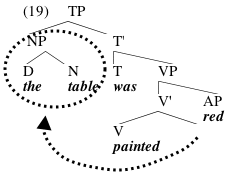
(1) I painted the table red
This sentence says that I painted the table, and that as a result of my painting, the table became red. The boldfaced adjective is what's called a resultative; it's telling you about a change that the object underwent. Here are some more examples of resultatives:
(2) She hammered the metal flat.
(3) He smashed the vase to smithereens.
(4) I wiped the table clean.
In all of these examples, the resultative is understood as modifying the direct object. This isn't an accident; resultatives always do seem to behave this way. Consider the examples in (5-7):
(5) *I painted the table sweaty.
(6) *I shouted hoarse.
(7) *I talked to John embarrassed.
None of these examples can have resultative readings. (5), for example, cannot mean that I became sweaty as a result of painting the table; (6) cannot mean that I shouted until I became hoarse; and (7) cannot mean that either I or John was embarrassed as a result of our talk. It's clear, in all these cases, what a resultative reading would be, and there's nothing pragmatically odd about any of the situations involved, but a resultative reading is impossible anyway.
So resultatives apparently must modify the object of the verb. In fact, we can be a little more specific than that. You might think that 'the object of the verb' was a notion that we could define in terms of selection; maybe the object is the NP that's selected by the verb. But we can show that that's not the case. Consider examples like (8-10):
(8) We laughed him off the stage.
(9) I shouted myself hoarse.
(10) He read the children to sleep.
What's interesting about these examples is that the NP that's getting the resultative applied to it is clearly not selected by the verb. We can see this by taking away the resultative:
(11)*We laughed him.
(12) *I shouted myself.
(13)#He read the children.
In (11-13), we can see that none of these verbs normally take objects, or at least not the types of objects they're taking in (8-10). (13) has a sort of weird reading in which he somehow decoded information that was encoded in the children; there isn't any such weirdness going on in (10). So when we say that resultatives modify the object of the verb, we don't mean that they modify the NP which is selected by the verb; in fact, in (8-10), the object is apparently selected by the resultative itself.
What we mean by 'object', then, when we're talking about resultatives, is apparently something about the position of certain NPs. What the objects in (1-4) and (8-10) all have in common is that they have to be right after the verb:
(14) *I painted quickly the table
red.
(15) *She hammered loudly the
metal flat.
(16) *We laughed raucously him
off the stage.
(17) *He read soothingly the
children to sleep.
In other words, when we say that resultatives can only modify objects, we mean that they can only modify the type of NP that has to be immediately post-verbal.
That generalization seems to cover all the facts as long as we stick to active verbs, but as soon as we look at passive verbs, it breaks down:
(18) The table was painted red.
Examples like (18) are a real problem for our generalization about resultatives! But as we've already seen, they're also a problem for our generalizations about selection. We considered two ways of fixing the problem when it came to selection:
Now, neither of these theories is a straw man; there are linguists who have argued for each of them. But the resultative facts argue for the second of these approaches, and against the first one.
On the first approach, the resultative data are very odd; resultatives cannot normally modify the subject, but in examples like (18) they apparently can. Moreover, the approach cannot say that resultatives modify the NP selected by the verb, because of data like the ones in (8-13); the phrase modified by the resultative need not be selected by the verb at all.
On the movement approach, on the other hand, the resultative facts can be explained straightforwardly. All we need to say is that the phrases modified by resultatives must begin as objects of the verb. Crucially, we have seen that 'object' here names a syntactic position, rather than anything involving selection; 'objects', in the relevant sense, are simply NPs which are adjacent to the verb. On this type of account, the well-formed example in (18) could be given a tree something like the one in (19):

In (19), as we expect, the resultative red modifies an NP which begins as the object of the verb.
Back to A-movement.